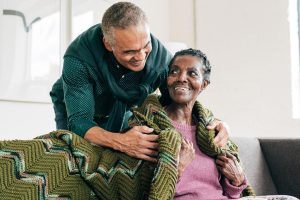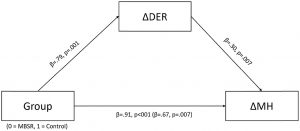
Mindful Loneliness
By John M. de Castro, Ph.D.
“We always tell people to quit smoking for health reasons, but rarely do we think about loneliness in the same way. We know that loneliness is a major risk factor for health problems and mortality in older adults. This research suggests that mindfulness meditation training is a promising intervention for improving the health of older adults.” – David Creswell
Humans are social creatures. We’ve been able to dominate our planet, not due to any particular physical prowess, but by our working together for the common good. This need for others is deeply embedded in our DNA. In fact, we are generally happiest when we’re with family and friends. Conversely, being without close social contact makes us miserable. It’s the close relationship that is so important as we can be around people all day at work and still feel deep loneliness. These contacts are frequently superficial and do not satisfy our deepest need. People can be involved in a lifelong marriage and still be lonely as sometimes these marriages lack the intimacy that is so needed. Hence, loneliness is common even when surrounded by other people.
It is sometimes said that we live in “the age of loneliness.” It is estimated that 20% of Americans suffer from persistent loneliness. This even when we are more connected than ever with the internet, text messaging, social media, etc. But, these create the kinds of superficial contacts that we think should be satisfying, but are generally not. This has led to the counterintuitive findings that young adults, 18-34, have greater concerns with loneliness than the elderly. This is very surprising as the elder years are considered a time of increasing loneliness. Indeed 18% of seniors live alone and 43% report feeling lonely on a regular basis.
The consequences of loneliness are dire. It has been estimated that being socially isolated increases mortality by 14%. This is twice the elevation produced by obesity. Even worse, for people over 60, loneliness increases their risk of death by 45%. When a spouse loses a marital partner there’s a 30% increase in mortality in the 6-months following the death. Hence, loneliness is not only an uncomfortable and unhappy state, but it is also a threat to health and longevity. It is clear that this epidemic of loneliness needs to be addressed.
Mindfulness is not a solution for loneliness, but it can help. Being in the present moment while we’re in the presence of others can heighten the intimacy of the interaction. Deeply listening to others and feeling loving kindness and compassion makes us closer to them and makes them feel closer to us. So, even in superficial contexts like work environments, mindfulness can make the relationships more satisfying and counteract loneliness. Mindfulness can be applied in many situations that seemingly anonymous and superficial, such as going for a walk. Just being fully present with the people you pass and who pass you, looking with compassion and smiling, can produce a smile in return or a “good morning” and produces a connection, albeit small, that decreases the loneliness of the moment. Just being in the present moment will almost automatically produce feelings of connectedness toward others and to some extent, reduce loneliness.
One of the keys to coping with loneliness is the realization that ultimately, we, like everyone else, are alone. Only we are aware of our true feelings, our experiences and how we’re interpreting them, our memories, and our consciousness itself. Someone very close to us can get some idea of what’s going on in our heads, but it is at best a poor approximation, and never exactly what we’re experiencing. So, one of the most important things that we can do to counteract loneliness is to become comfortable with ourselves, to really get to know ourselves deeply, with mindfulness, without judgment, and with loving kindness.
We do everything we can to avoid dealing with our aloneness. Particularly in modern society we never allow ourselves to truly be alone. Even when isolated from others we distract ourselves constantly with TV, movies, music, the internet, games, social media, etc. I was recently on a wonderful walk with my spouse along a beautiful path by a river. It was a great place to be connected to the environment in the present moment and enjoy just being with yourself. Yet I saw many people with earphones on listening to music and others on their phones, talking, texting, or immersed in whatever was on their screens. They distracted themselves from being alone even though they were in a fantastic place to be alone.
Distracting ourselves is a symptom of the fact that most westerners don’t actually like themselves. Our society somehow creates feelings of self-dislike. There’s a deep feeling engendered that there’s something wrong with us. Our way of coping with this uncomfortable and threatening situation is by avoiding ourselves and distracting our minds whenever there may be any hint of being alone and having to deal with our perceived unworthy selves. But, this suggests that the antidote to loneliness may be finding a way to love ourselves. This could transform loneliness into an enjoyable state of solitude. Loneliness and solitude are objectively the same, we’re by ourselves. But, loneliness is an unhappy state where we rue the lack of intimate contact with others while solitude is the joy of being alone. It is being in harmony with ourselves and enjoying the process of being by ourselves. Developing self-like, then may be the key to transforming loneliness to happy solitude.
Meditation practice can be a key to attaining a state of joyous solitude. In meditation, we can learn to be comfortable with our internal state. Others are not needed to validate our feelings and experiences. We can simply experience our feeling without judging them. We can see feelings arising and falling away. We can see them as just another thing that is impermanent. One strategy is to actually meditation on loneliness. In this practice, we engage in deeply feeling loneliness, experiencing how we feel inside when we are lonely; not judging it, just feeling it. We focus on the physiological expression of loneliness; sensing the internal sensations that accompany it. This helps us to become sensitive to this state and recognize it, even when it’s mild and subtle. Once we are aware that loneliness is what we’re feeling, we’re better able to address it in real time, we’re better able to see it as just a feeling that doesn’t say anything about ourselves, we’re better able to understand that it doesn’t mean that there’s something wrong with us, we’re better able to know that it is impermanent and will fall away. In other words, we become much better at being alone, being in solitude.
In the contemplative meditative state, we can develop self-like. Seeing ourselves without judgment is helpful, but it is often important to nurture good feeling about ourselves. Loving kindness meditation can be very helpful in this regard. This technique helps us to be kind and compassionate toward ourselves. In this meditation, we focus on bringing lovingkindness to ourselves. Envisioning a time when we felt completely loved and accepted, feeling what it was like, feeling the inner sensations and the ease of well-being. Once this is fully present we begin slowly and meaningfully to say to ourselves: “May I be happy. May I be well. May I be safe. May I be peaceful and at ease.” We wholeheartedly engage in honestly wishing ourselves well and visualizing how it would feel to truly be happy, well, safe, and peaceful; sincerely making these wishes in the unshakable knowledge that we deserve to be happy, well, safe, and peaceful. This is a seemingly ridiculously simple technique has been demonstrated to be very impactful. It improves our emotional state and develops self-love overcoming self-dislike.
In order to overcome loneliness, we must be comfortable with ourselves first. We must be good company for ourselves. This stops the running away and constantly needing to distract ourselves. When we can do this we then become much better companions for others. We are no longer using them to validate ourselves, to work out our problems, and to feel better about ourselves by denigrating them. Others come to like us more and want to be around us more, counteracting loneliness. So, learning to like being with ourselves, finding solitude joyous, we can not only feel better about being alone, but also improve our social situation and be alone less often.
So, don’t try to overcome loneliness by looking to others to fix the problem. Get comfortable with the ourselves first, learning to enjoy solitude. Then develop loving kindness towards ourselves and learn to like ourselves. This is the magic formula for coping with loneliness; learning to enjoy being with ourselves. So, even when we’re alone, we’re still happy. But, in the process, we become more likable and attractive to others, making being alone occur less often. It seems strange to think that developing our experience of solitude is the solution to loneliness. But, that is exactly the necessary solution.
“Slowly practicing mindfully to move away from the story, solitude can emerge. It can be beautiful, for in your solitude you actually end up connecting to humanity by connecting to your own humanness. Slowly you stop over analyzing your story and stop running away from your feelings and space opens up to do whatever you enjoy when you are by yourself.” – Sadia Raval
“Becoming mindful in this way of what factors give rise to loneliness in your life, and learning to question the validity of the stories you tell yourself about it, makes it more manageable. Then, with an attitude of kind benevolence toward yourself, let the loneliness be and allow compassion to arise over any suffering you’re experiencing. “ – Toni Bernhard
CMCS – Center for Mindfulness and Contemplative Studies
This and other Contemplative Studies posts are also available on Google+ https://plus.google.com/106784388191201299496/posts and on Twitter @MindfulResearch









